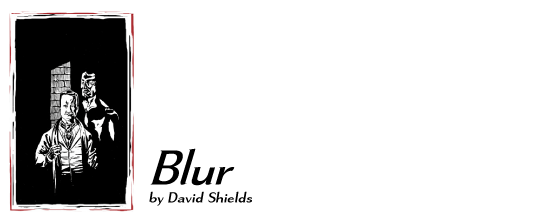
(an excerpt from the forthcoming Reality Hunger: A Manifesto [Knopf, February 2010])
1
I think of fiction, nonfiction, poetry, drama, and all forms of storytelling as existing on a rather wide continuum, at one end fantasy (J.R.R. Tolkien and the like) and at the other end an extremely literal-minded register of a life, such as a guy in eastern Washington--named, as fate would have it, Shields--who has kept the longest or longest-running diary, endless accounts of everything he does all day. And in between at various tiny increments are greater and lesser imaginative projects. An awful lot of fiction is immensely autobiographical, and a lot of nonfiction is highly imagined. We dream ourselves awake every minute of the day. “Fiction” / “nonfiction” is an utterly useless distinction.
2
Tell all the Truth but tell it slant.
3
Genre-mingling is responsible in no small measure for the moral debility of intellect and character and will.
4
These categories are plastic.
But they aren’t.
Ah, but they are.
5
I like to write stuff that’s only an inch from life, from what really happened, but all the art is of course in that inch. My books tend not to have the narrative and story you associate with fiction, but at the same time they are arranged and structured, to put it somewhat pompously, as works of art rather than accumulations of information. To that extent, I like to think they’re more novel than many novels.
6
The grist of the material is factual--a narrative with people whose names you can look up in the phone book or who have historically verifiable existences--but it’s fiction in the sense that it’s heavily patterned and plotted; it’s structured like a novel.
7
I’m interested in the generic edge, the boundary between what are roughly called nonfiction and fiction.
8
The generic line between fact and fiction is fuzzier than most people find it convenient to admit. There is the commonsensical assertion that while the novelist is engaged on a work of the creative imagination, the duty of the journalist is to tell what really happened, as it happened. That distinction is easy to voice but hard to sustain in logic. For imagination and memory are Siamese twins, and you cannot cut them so cleanly apart. There’s a good case for arguing that any narrative account is a form of fiction. The moment you start to arrange the world in words, you alter its nature. The words themselves begin to suggest patterns and connections that seemed at the time to be absent from the events the words describe. Then the story takes hold. It begins to determine what goes in and what’s left out. It has its own logic and it carries the writer along with it. He may well set out to write one story and find that he’s writing quite another. The more self-consciously language is used, the more responsive the writer is to the medium in which he works, the more elaborate that fashioning is. The naïve storyteller will burden you with a mass of irrelevancies, which get into the story just because he remembers that they happened to be there; the sophisticated storyteller will fashion his contingencies so that they support and move his story forward. That is fiction-making.
9
I have never written fiction, and this memoir may be as close as I ever get to it. No more than a biography or a novel is a memoir true to life. Because, truly, life is just one damn thing after another. The writer’s business is to find the shape of unruly life and to serve her story. Not, you may note, to serve her family, or to serve the truth, but to serve the story. There really is no choice. A reporter of fact is in service to the facts, a eulogist to the family of the dead, but a writer serves the story without apology to competing claims. This is an attitude that some have characterized as ruthless: that cold detachment, that remove, that allows writers to make a commodity of the lives of others. But a writer who cannot separate herself from her characters and see them within the full spectrum of their human qualities loses everything in a haze of nostalgia. Now you may ask: just what is the relation of your memoir to the truth? It is as close as it can be. The moment you put pen to paper and begin to shape a story, the essential nature of life--that one damn thing after another--is lost.
10
Good nonfiction has to be as carefully shaped as good fiction, and I’m not bothered at all by this artifice.
11
You adulterate the truth as you try to write. There isn’t any pretense that you try to arrive at the literal truth. And the only consolation when you confess to this flaw is that you are seeking to arrive at poetic truth, which can be reached only through fabrication, imagination, stylization. What I’m striving for is authenticity; none of it is real.
-----
Page 1 2 3 4 5

